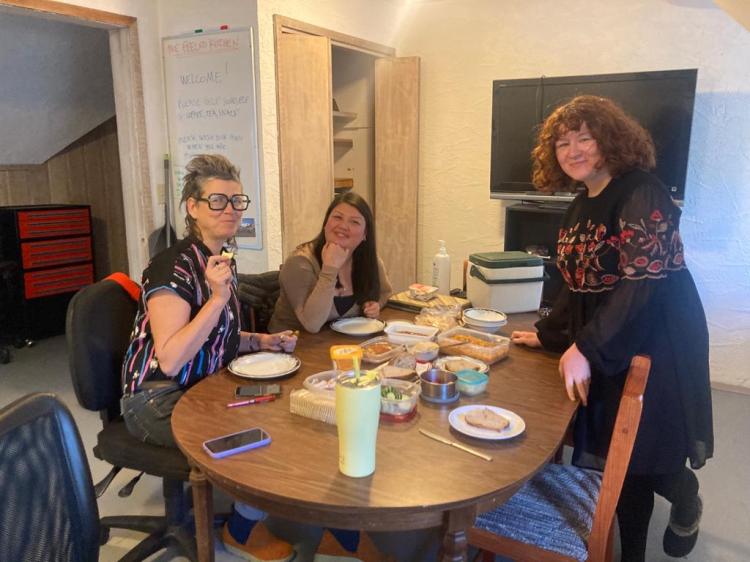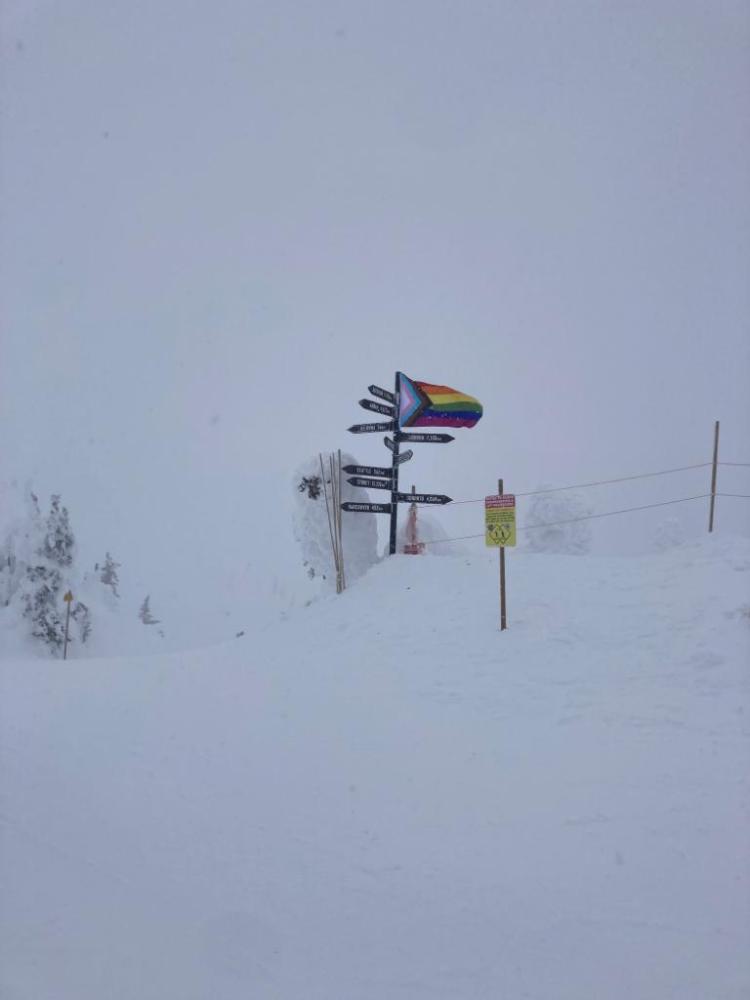This FEELed Note is by Jennifer Mae Hamilton, Visiting Researcher at the FEELed Lab January-February 2023, and ongoing FEELed Lab Research Affiliate.
I am an academic based on Anaiwan Country in Australia, a small city called Armidale halfway between Sydney and Brisbane. The city is inland on high country tablelands. It is in some ways similar to Kelowna (regional, agricultural, a decent drive from the State capital, settler-colonial, with a University) except the landscape here is older. We don’t have a huge lake, but rather a small creek and the mountains are much smaller. We’re at 1000m and almost at the top of the range. But still it frosts in Winter, which people find strange for a city so far north in Australia. I was lucky enough to be at the FEELed Lab when Therese Keogh was there from Australia too and while Dani Pierson was living downstairs. Therese and I painted a little gift to the Lab: some signs. This gift in very small way recognises and contributes to the immense gift that is The FEELed Lab.


I am an academic in Australia. I teach literary and gender studies at a small regional University, and I came to the FEELed Lab for a short sabbatical in January and February of 2023 to work on my second monograph currently titled: Weathering the City. I first worked with Astrida in Sydney, where we started the COMPOSTING reading group, and I helped with the Hacking the Anthropocene events. It was a real privilege to have time to reconnect with Astrida and I’m grateful to my employer the University of New England for supporting both in cash and in kind my sabbatical application as this was an invaluable trip for my research and I will be bringing the energy, ideas and new connections I have received from it back to the community on campus and in town in Armidale.
What I really took away from my time at The FEELed Lab is that as academics and creators we are weather-makers. In taking a job in Armidale, I found that I was separated from my creative community in Sydney and I had to find new ways of building community around my research. At the same time (both in Sydney and again once in Armidale) I was also being trained in how research can be taken to community. This desire for institutions to do work in community and demonstrate impact is driving research and funding agendas right now. Rightly we were told that academics can be arrogant and think they know what is best. They then go into communities and tell them what is good for them. We were told we shouldn’t do that. If we want to collaborate with community, we have to listen. In the framework of Australian Research Council (ARC) Linkage grants for example, we have to basically respond directly to a community need. I agree that in some contexts absolutely we should step back and listen, but I don’t think this principle is a universally true or right. Sometimes academics should make their own weather in a community. Given all we know and all the time we’ve spent developing our skills, perhaps we also have something to bring to and offer up to a community. What I was struck by at the FEELed Lab is the way that it is building a creative and scholarly community from the ground up at Woodhaven in ways that really makes new weather in the community. And the offering of the FEELed Lab creates its own microclimate. People are drawn to their preferred climate and if there isn’t one in the community, people might be just sheltering in place until they feel safe and comfortable to come out. If we only listen to the loud voices shaping the discourse about what the community needs, we will never know what people who are not speaking need. Woodhaven Eco-cultural Centre pre-dates FEELed Lab, and there is a precedent there and a legacy to build on, but it still feels like FEELed lab is doing the work of weathering in place without trying to assimilate or cow to established local expectations and cultural norms. I didn’t spend heaps of time out and about in Kelowna, but FEELed Lab feels very different to the dominant culture of the place. It was really refreshing for me coming to the place after five years in Armidale and be reminded that we can just do the work wherever we are.
What is “the work”? For me the basic work is weathering: this is developing this concept and translating this concept into community practice. What I kind of shied away from coming to Armidale (and anyone who knows me in Armidale will not think what I have done is “shying away” but still it feels a little bit like that) is the embodied-self piece of the weathering puzzle. I have assimilated too readily to the cultural norm of the place and sought to be less proud of my weirdness and just support people where they are at in understanding the question of climate change in relation to themselves. Sure there’s a little bit of weirdness in there, but only a little bit. This is fine to some extent, baby steps, but I also feel that I need to be willing just to do culturally strange things as part of weathering. We are weathering settler-colonial heteropatriarchy too, so what about doing some things that really weather that, like being a sandstorm rather than a light breeze? We are, after all, weather bodies ourselves.

This latter aspect of weathering I was reminded of really strongly by Astrida as a vital piece of the weathering puzzle both just by virtue of what is happening at FEELed Lab and also our talks at UBC-Vancouver. We gave some talks at UBC-V in the Institute for Gender, Race, Sexuality and Social Justice (https://grsj.arts.ubc.ca/) and Institute for Resources, Environment and Sustainability (https://ires.ubc.ca/). One of the key points we were making is that we can create the weather. I am certain my own experience at FEELed lab will be marked by this kind of empowering sense of weathering. Not being weathered away, but doing some weathering away at other things. One of the outcomes of this trip that is really concrete is that Astrida and I are going to write a book about weathering. Before I came to FEELed Lab unsure if this was a good idea – there is so much already out there and what do we have to say that we’ve not already said – but our talks and our explorations of weathering and really being concrete and accessible about what this means made it clear to both of us that there is work to be done to better disseminate our ideas. So I am feeling renewed, and also I really hope to come back at the FEELed Lab one day. It’s such a special place.


